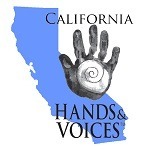by Rosabel Agbayani
Member of California Hands & Voices
I have always been attracted to the caring, compassionate, and purposeful work of health services. I spent 5 years working as an Administrative Medical Assistant in and worked in Healthcare Administration for several years with a focus on Patient Relations and Quality Improvement. Working with physicians and specialists providing health and human services, I thought I knew all there was to know about caring for people and helping families.
However, on September 30, 2010 my family received a diagnosis that would change the course of our lives. Our healthy and active 3½ year-old son Michael was diagnosed with Pre-lingual Moderate-Severe Bilateral Conductive Hearing Loss.
Long story short, I remember leaving the Audiology office in a panic and in tears. Having always been on the providing end of patient services, I was unexpectedly confused and frustrated on the receiving end. It wasn’t the Audiologist fault. Her training and background helped her prepare to give patients information on treatment for hearing disorders. But at the time I wished I had someone to help me figure out where to go to for help.
It wasn’t an easy path, but little by little I chipped away and found a way to navigate through this new way of life for our family. I was referred to the school district to start the process of early intervention. I learned how to coordinate services with our healthcare professionals and insurance carrier for additional speech and hearing services. I found the Internet to be my go-to manual and appreciated the vast amount of information about communication and education options available within and around our community. In addition, the World Wide Web opened new avenues of communication where I was able to network with families, professionals, and educators through forum boards and social media sites. Eventually, I met families like ours who were newly diagnosed and families who have been on this journey for many years. I realized that we were not alone. Slowly I began to feel comfortable with asking the right questions and finding the answers we needed. Knowing our options and becoming an informed parent, I felt empowered to make decisions that were right for our child.
Almost 2 years after my son was diagnosed as Hard of Hearing I decided to return to school and obtain a 2nd Bachelors Degree in Communicative Disorders and Deaf Education through Utah State University’s Online Degree Program. Motivated by my primary need to help my own child, I was inspired to pursue a career in the field of Audiology and to help families raising children who are Deaf and Hard of Hearing.
As a professional, I believe it is important to understand the unique needs of DHH children and their families. When a child is diagnosed as Deaf and/or Hard of Hearing the dynamics of the family changes. It is a stressful time for everyone involved. Parents need to know information on all aspects of hearing loss including the physiological, psychological, and social aspects of how the disorder affects the individual and their families. Non-biased and useful information is essential to helping families make informed decisions about their child’s future, choices for communication, and educational options.
The true value of quality health and human service (which includes Audiologists, SLPs, Teachers of the Deaf, and other disciplines involved in the DHH community) is finding professionals who are passionate, have an open mind, and open heart with a willingness to listen carefully to the needs of DHH children and their families. By sharing knowledge and expertise, professionals can facilitate the process of healing for all members of the family. Helping families feel comfortable with their choices makes them feel empowered. Empowering families increases the chances of that child accessing the services they need in order for them to succeed.
As I continue to pursue a career helping DHH Families, I consider myself lucky to have had this life experience. Caring, Compassion, and Dignity are not subjects taught within classroom walls. It is something that is felt with the heart and influences the mind to treat others with the respect and honesty that they deserve. My son has been my best and most important teacher because he has taught me to listen to his needs before considering any therapy treatments, or services. It is something that I will always prioritize as I continue to help others in the community.
The past five years has taught me so much about my son, myself, and my family. It taught me how to put the “care” back into healthcare. Although our journey continues and the challenges we face are continuously evolving, we are a stronger and happier family than we have ever been because of what we have been through. My hope is to continue to pursue my career endeavors so that one day I can pay it forward and help inspire future DHH families to become confident, empowered decision makers in their own child’s life.
